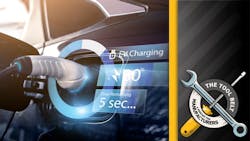Podcast: How to prevent EV charger infrastructure downtime
Rue Phillips is the co-founder and president of SkillFusion, a platform that connects electric vehicle operations and maintenance service providers with a nationwide credentialed talent pool for electric vehicle service equipment O&M obligations. Rue has been at the forefront of developing online platforms that connect cleantech asset owners with a local and on-demand installation and service workforce, first in the solar sector with 365 Pronto and now in the EV charging sector. Rue also hosts EV Chat, a podcast with a rock'n'roll spin elevating industry leaders and making their knowledge and insight accessible to those across the electric vehicle space. Rue recently spoke with Plant Services editor in chief Thomas Wilk about the challenges of finding skilled workers for the EV infrastructure industry.
Below is an excerpt from the podcast:
PS: I'm looking forward to talking with you today because of the work you're doing when it comes to skills development, especially in a sector that we haven't covered directly in Plant Services when it comes to skill development: the EV charging sector. Could you start by telling us about yourself and about SkillFusion, and what seems to keep drawing you back to cleantech for the past couple of decades.
RP: Yeah, my name is Rue Phillips, I've been in the electric vehicle space since oh my gosh, 1996 in California. I had my contract in business, and I answered an RFP, which is a request for proposal, for zed mandate, zero emission vehicle. This was back in the ’90s and it basically said that by 2012, 10% of vehicles in California had to be zero emission. So I was part of this RFP to gather contractors together, and I've been installing servicing, maintaining electric vehicle fleets, their chargers moreover, since 1996. I co-formed SkillFusion for a basic need to a dire need, if you like, in the industry, to help bring in skilled talent workforce to the electric vehicle industry. Right now we have a bit of a problem, where the infrastructure needs to be a little bit more robust, reliable, and operable. So yeah, that's a little bit about SkillFusion and what we do.
PS: You know, it's interesting, we've been keeping track of new plant openings in the U.S. this year. It's a simple Google map, we drop a pin on the map whenever we hear of a new plant opening up. And such a strong number of those plants are electric vehicle plants or EV battery plants. The skills shortage, I guess, in industrial manufacturing at least in the US was already somewhat acute. Your focus on the EV industry, especially EV chargers, strikes me as similar, which is that can be a challenge to find skilled workers. Is that a fair statement for the EV side of the business these days? And do you see this changing anytime soon?
RP: I think it is a fair statement, Tom. There is basically, to put it blunt, there's a shortage of skilled labor. We have an electric revolution that's going on, and I think for the most part, and this has been going for a few years now, is that young kids when they graduate, they think they have to go and get an MBA, you know, and the skilled trades – electricians, carpenters, plumbers, which are going to be with us for decades to come – there's not enough infusion of young people to reinforce that workforce if you like. So I think absolutely, there is a shortage. What we're going to do about it, well there’s education in schools, the renewable revolution is happening, solar electric vehicles, battery energy storage is happening all around us. But I think we're just a little bit slow out of the gate Tom.
PS: You know, I've got three boys, I've got a 12 year old and twin 10 year olds, and the message about being more sustainable is definitely sinking in with them. They get on the case of my wife and I whenever we don't recycle, for example, or put the cans in the wrong recycle container. They've seen EV chargers pop up in say unused bank parking lots, unused grocery store parking lots, or they lease space in those parking lots. Like you said, though, I don't know that they've connected what they're seeing, and the message they're hearing, with a possible career in this field to maintain the equipment.
RP: Yeah, myself and my partner, Elaina Farnsworth, we're active in the education of young kids. We're doing something in San Bernardino, CA, and it's really, really good. For these young aspiring workers that want to get into the renewable technologies, there’s great opportunities out there for the young kids.
PS: Do you think the skill shortage in EV is a result possibly of the relative newness of the technology? For context, I'm thinking of the fact that large libraries exist for industrial manufacturing for traditional rotating equipment, things like motors and pumps. And these libraries have lists of known faults and failure modes for a lot of different models. I'm curious to know how close is the EV infrastructure industry to matching those kinds of libraries and historical knowledge for things like likely faults?
RP: Well, you know, Tom, the fact is, these are smart devices we're using, these chargers have processors in them, they talk to the cloud. They do indeed have error codes when there's a problem. I think that the main issue is that the manufacturers, obviously, are not sharing that information. It's proprietary information, you know, mean time between failures are quite proprietary. But we do need some commonality as far as bringing the technologies together, so that we can actually support them from this field service. The technician doesn't have to be specific to one technology, he can be generic and agnostic in going out there repairing a whole bundle of manufacturers. So in short, we do have that technology right now, we do have the ability to see the failure codes, it's just a little early days but watch this space.
Read the rest of the transcript
About the Author

Thomas Wilk
editor in chief
Thomas Wilk joined Plant Services as editor in chief in 2014. Previously, Wilk was content strategist / mobile media manager at Panduit. Prior to Panduit, Tom was lead editor for Battelle Memorial Institute's Environmental Restoration team, and taught business and technical writing at Ohio State University for eight years. Tom holds a BA from the University of Illinois and an MA from Ohio State University
